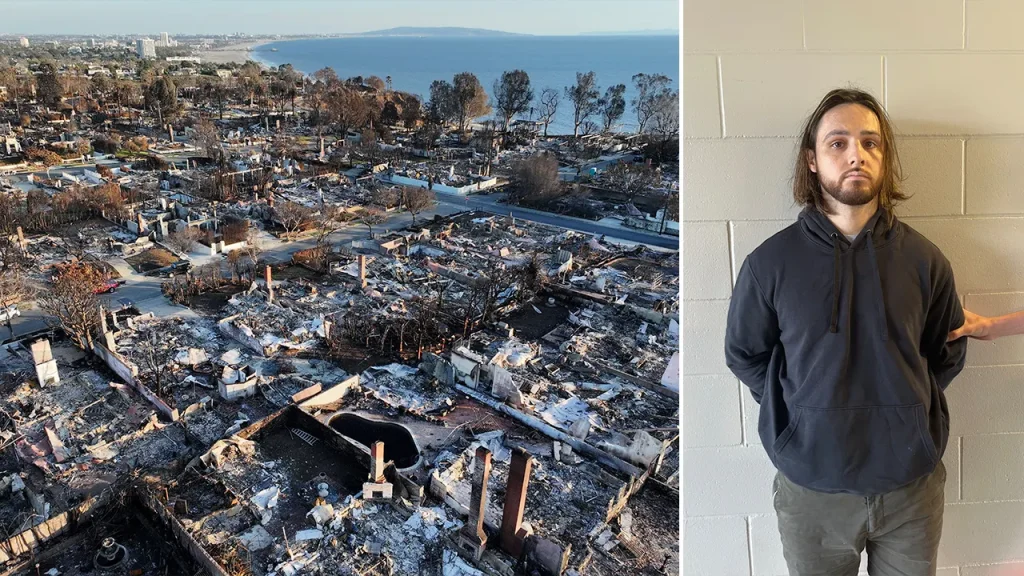Arrest Made in Deadly Palisades Fire: Florida Man Charged with Starting Catastrophic Blaze
In a significant development that brings hope for closure to thousands of victims, authorities have arrested 29-year-old Jonathan Rinderknecht in connection with the devastating Palisades Fire that ravaged parts of Los Angeles earlier this year. The announcement came during a Wednesday press conference following Rinderknecht’s Tuesday arrest at his Melbourne, Florida home. The suspect, who also goes by Jonathan Rinder, stands accused of intentionally starting what began as the Lachman Fire shortly after midnight on New Year’s Day. According to the criminal complaint, this initial blaze—though seemingly contained—continued smoldering underground until winds eventually reignited it, triggering the catastrophic Palisades Fire that would leave an indelible mark on Southern California communities.
The investigation revealed disturbing details about Rinderknecht, who worked as an Uber driver in the Palisades area. Passengers who rode with him on the night of the alleged arson described him as “agitated and angry,” according to documents obtained by Fox News. Prosecutors believe Rinderknecht used an “open flame” to start the fire shortly after dropping off passengers in a neighborhood he was familiar with as a former resident. The complaint further alleges unusual behavior and potential premeditation, noting that Rinderknecht told passengers he had grown up in France and played French rap music during rides—specifically a song by artist Josman with a music video depicting fire scenes. Perhaps most chillingly, investigators found evidence suggesting Rinderknecht had used ChatGPT to generate images of what was described as a “dystopian painting” showing a burning city with “hundreds of thousands of people in poverty trying to get past a gigantic gate with a big dollar sign on it.”
The human toll of this disaster cannot be overstated. Twelve people lost their lives as the Palisades Fire tore through the Pacific Palisades community and parts of Malibu. Beyond the tragic loss of life, the fire’s destruction was staggering in its scope—more than 6,800 buildings were consumed by the flames, leaving countless families and business owners to face the daunting task of rebuilding their lives from ashes. The scale of devastation transformed picturesque coastal neighborhoods into apocalyptic landscapes of charred remains, forcing evacuations and leaving psychological scars that will take years to heal. For many survivors, the arrest represents the first step toward understanding the incomprehensible: how a single act could lead to such widespread suffering and loss.
In the months since the fire, affected communities have lived in an uncomfortable limbo—grieving their losses while simultaneously demanding answers about how and why this tragedy occurred. Local officials, including LA Mayor Bass, reportedly delayed releasing the Palisades Fire report at the Department of Justice’s request as the investigation unfolded. This created tension between the need for transparency and the requirements of building a criminal case against whoever was responsible. Many victims expressed frustration at what seemed like slow progress, particularly as they faced the immediate challenges of securing housing, navigating insurance claims, and making impossible decisions about whether to rebuild in an area now marked by trauma. The arrest announcement has been met with a complex mixture of relief, anger, and for some, a renewed sense of grief as they confront the apparent senselessness of the disaster’s origin.
What makes this case particularly disturbing is the apparent disconnect between the simplicity of the alleged act—setting a small fire—and the catastrophic consequences that followed. The Lachman Fire, which authorities believe Rinderknecht started, was initially contained. However, in a tragic sequence of events that highlights the unpredictable nature of wildfires in Southern California’s climate, this seemingly controlled blaze continued burning underground, hidden from view until winds created conditions for it to explode into the massive Palisades Fire. The fire’s rapid growth—from 50 acres to over 1,000 acres in just hours—overwhelmed firefighting efforts and created chaotic conditions as residents fled with whatever belongings they could gather. This case underscores the extraordinary danger posed by fire in drought-stricken California, where even a small ignition source can lead to unimaginable devastation when combined with the region’s dry vegetation and unpredictable winds.
As Rinderknecht makes his initial court appearance in Orlando before facing extradition to California, the long process of seeking justice is just beginning. For the communities of Pacific Palisades and Malibu, recovery efforts continue with a new context for understanding their tragedy. Some residents have already begun the rebuilding process, breaking ground on new homes and businesses with determination to restore what was lost. Others remain undecided, weighing the emotional attachment to their communities against the trauma of the fire and the ongoing wildfire risk in the region. What unites them all is the desire for accountability and the hope that understanding how this disaster began might somehow help them make sense of their losses and move forward. As prosecutors build their case against Rinderknecht, the communities he allegedly devastated will be watching closely—seeking not just legal justice, but the harder-to-define emotional closure that comes from knowing why their lives were so profoundly disrupted by flames that began as a small fire on New Year’s Day.


